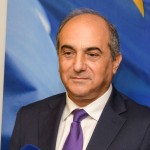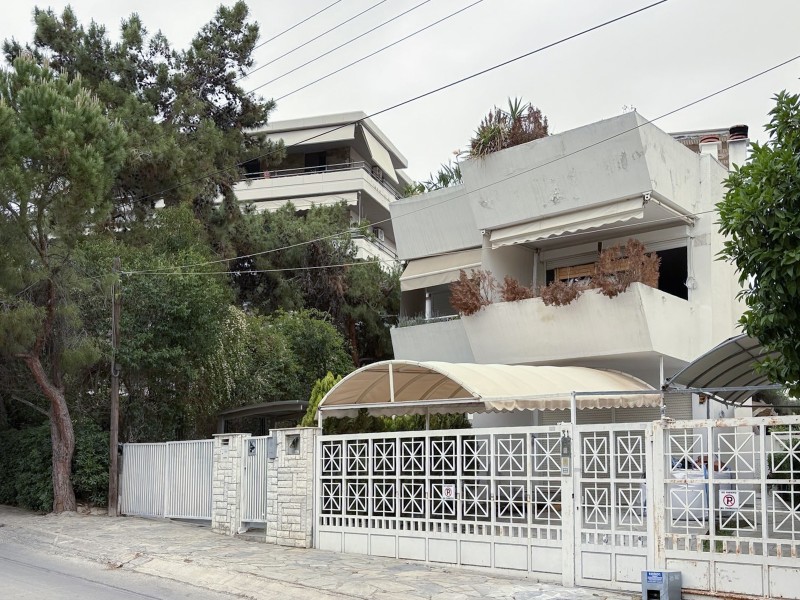Reported by
Eight years ago, a Mercedes Benz crashed into another car on a highway in western Ukraine, killing a 31-year-old woman. Photos captured the Ukrainian tycoon Petro Dyminskyy at the scene of the accident, though it was not confirmed if he had been the driver. Four days later, he reportedly left the country on a private jet.
Dyminskyy is still wanted by Ukrainian authorities, and while he has been spotted by media in a string of European countries in the years since, his whereabouts remain unknown. A pre-trial investigation has been put on pause while officials seek to locate him, prosecutors told OCCRP’s Ukrainian partner NGL.media.
Now, reporters have discovered that the 70-year-old took action soon after the crash to secure his status abroad, obtaining residency in Greece and citizenship in Serbia.
Ukrainian tycoon Petro Dyminskyy at the accident scene on August 18, 2017, in the Lviv region of western Ukraine.
Before leaving Ukraine, Dyminskyy carried the classic oligarch set: he owned a football team in Lviv, a TV Channel, and had served in parliament for several years. With a fortune of $103 million, he was ranked 44th on Forbes’ list of richest Ukrainians in 2016.
Records obtained by OCCRP and partners show that two months after the deadly collision, he spent 280,000 euros on a gated duplex in the Athens suburb of Voula. The investment qualified him for a Greek Golden Visa, which comes with a residence permit and visa-free travel throughout the Schengen zone.
Dyminskyy renewed the visa in November 2022, records show, and left Greece that same day, according to travel data seen by OCCRP’s Greek partner Inside Story. It is not known if he returned. When reporters visited the address of his duplex in May, the building appeared run-down and partly under renovation.
Dyminskyy purchased a duplex in the Athens suburb of Voula for 280,000 euros two months after the deadly car crash.
Greek police and the ministry of migration declined to comment on his case.
Dyminskyy did not respond to questions reporters sent to his daughter and lawyer.
Shortly after buying his Greek property, Dyminskyy also managed to secure a Serbian passport in November 2017, a different set of leaked border data shows. Three years later, his wife Olena obtained citizenship from the Balkan state as well. The couple flew from Athens to Belgrade and back on the day the document was issued, according to the border data seen by Inside Story.
Serbia’s Ministry of Interior said Dyminskyy was granted citizenship because it was deemed in the "state’s interest," without providing further details.
While the country does not offer a pay-for-a-passport scheme, it has handed out citizenships to high-profile foreign nationals before, including politicians from Romania and Thailand who were wanted by authorities in their homelands.
Nikola Kovacevic, a Serbian lawyer who specializes in migration and asylum, said the state’s decisions to grant citizenship to foreigners who are "financially well-off" or "influential" have historically been "directed more by political than by legal criteria."
In contrast, asylum seekers "from countries where political persecution is far more problematic" may struggle to receive protection, he added.
Apart from his new travel documents, Dyminskyy’s ability to rebuild a life abroad has also been eased by the absence of an international arrest warrant against him.
According to Ukraine’s court registry, Interpol removed a blue notice — a request for information about a person of interest — that was posted for Dyminskyy in 2018. Interpol later denied requests from Ukraine to post a red notice, the last time in 2023. Both Interpol and Ukrainian authorities declined to say why.
Links to Serbia’s Arms Industry
The Serbian passport is not the oligarch’s only tie to the Balkan state, reporters from OCCRP's Serbian member center KRIK found. Company records show that a firm currently owned by Dyminksyy’s wife has also lent millions of euros to a company involved in the country’s weapons trade.
In June 2019, Dyminskyy sold his TV station, ZIK TV, to Taras Kozak, a former MP that Ukraine's government has accused of being pro-Kremlin. Journalists rapidly departed after the sale, and the channel was later accused by Ukrainian officials of spreading pro-Russian propaganda. It was blocked by Ukrainian authorities in February 2021.
The sale price was not disclosed at the time, but company records show the channel was sold for $27.4 million through the Cypriot-registered firm Ablemark Limited, which was controlled by Dyminskyy's wife and daughters at the time. (Dyminskyy himself had previously been listed as a beneficiary of the company in 2017).
Not long after, Ablemark started loaning millions to different companies — including one later granted licenses in Serbia to export arms.
In February 2020, Ablemark gave a 2.6 million euro interest-free loan to the Cypriot company Jikinto Limited. By April, Jikinto was granted the first of several Serbian weapons export permits, and went on to sell more than 10.3 million euros worth of Serbian arms to Uganda’s defense ministry that year. Reporters could not confirm Jikinto's ultimate beneficiary.
According to leaked documents from a Cypriot corporate service provider, Jikinto returned 1.6 million euros to Ablemark in November 2020. It is not known if the rest of the loan was repaid.
The Belarusian Investigative Center (BIC) and Bojana Jovanović (KRIK, Serbia) contributed reporting. Research and Data expertise was provided on this story by OCCRP’s Research and Data Team.





